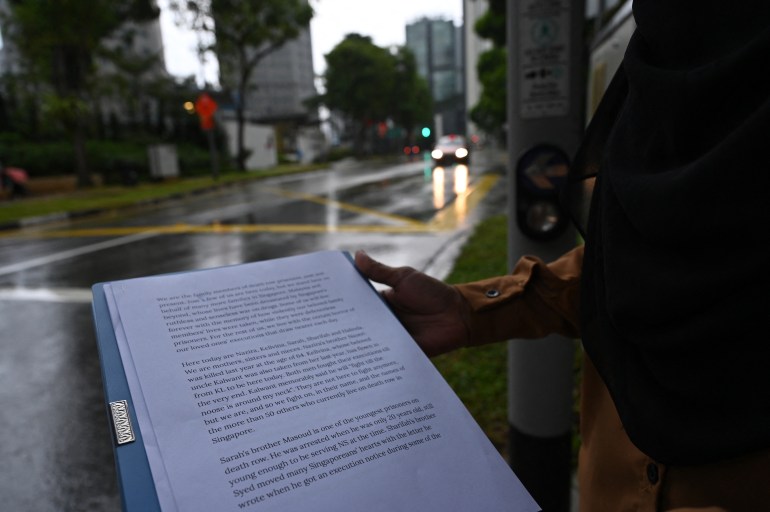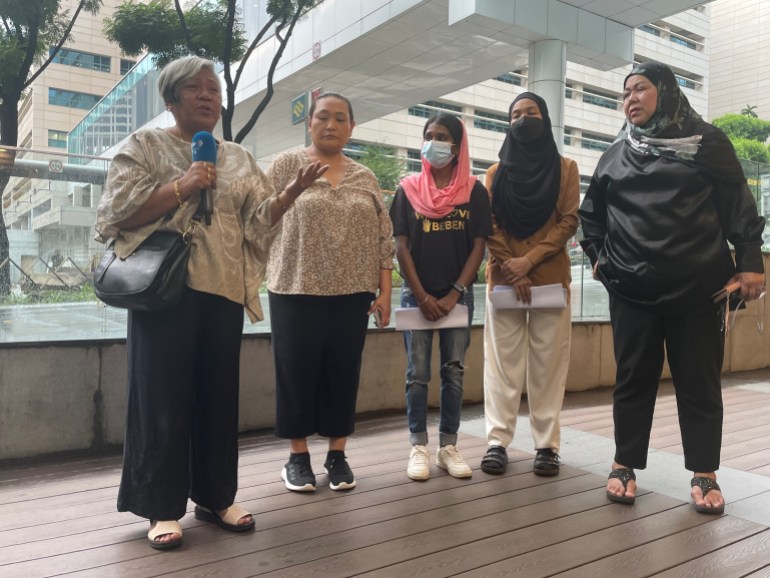Families of the executed appeal to ‘heartless’ Singapore for change | Death Penalty News
Singapore – Family members of prisoners on Singapore’s death row are calling on the government to bring an immediate moratorium on executions and implement a review of the city state’s use of the death penalty.
Relatives of executed prisoners were among those who delivered a petition to the country’s Ministry of Home Affairs on Monday, the eve of World Day Against the Death Penalty.
The petition gathered more than 1,700 signatures.
At least 16 people have been hanged in the Southeast Asian country since 2022 when executions resumed following a lull during the pandemic.
“It’s high time that the government looks into this matter. They are so stubborn. They are so strict about the death penalty,” said Nazira Lajim Hertslet, the sister of Nazeri bin Lajim who was executed last year.
Nazeri was sentenced to death in 2017 after being found guilty of possessing just more than 33 grams (1.1 ounces) of heroin for the purpose of trafficking. He was 64 years old when he was hanged last July.
“He [Nazeri] wanted me to tell the whole world about our Singapore government law which is not fair at all for him,” explains Nazira, who has been a vocal critic of the death penalty since her brother was hanged.
“I’m just worried how many more lives they will take away,” Nazria told Al Jazeera.
Activists believe there are currently about 50 prisoners on death row in Singapore, with all but three of them jailed for drug-related offences.
Singapore’s use of the death penalty for drug offences made international headlines earlier this year when 46-year-old Tangaraju Suppiah was hanged.
He was sentenced to death in 2018 for abetting the attempted trafficking of just more than 1kg (35 ounces) of cannabis.
His execution was condemned by the United Nations and British billionaire Richard Branson.
Amnesty International says Singapore was one of only four countries last year where drug-related executions were confirmed.
Singapore’s Ministry of Home Affairs says the use of the death penalty for drug offences is an effective deterrent that keeps Singaporeans “safe from the harmful effects of drugs”.
Campaigners disagree, arguing that executing prisoners for drug offences does little to deal with the wider issues feeding the illegal drug trade.
“There definitely needs to be a more comprehensive view of what drives people towards drugs, rather than putting on a performative stance of the death penalty just to appease people that we are safe,” said Elijah Tay from Transformative Justice Collective, a Singapore campaign group.

Alongside the petition, campaigners also delivered a letter addressed to K Shanmugam, Singapore’s Minister for Law and Home Affairs.
They urged him to meet “the victims of Singapore’s ruthless and senseless war on drugs”.
Campaigners were denied access to the Ministry of Home Affairs building as they had failed to make an official appointment. Instead, the petition and letters were handed in to security officials.
Al Jazeera contacted the Ministry of Home Affairs for a response.
‘We were all stunned’
Joining the families at the ministry was Sharifah Syed Zin. Her brother, Syed Suhail bin Syed Zin, was sentenced to death in 2016 for possessing just more than 38g (1.3 ounces) of heroin for trafficking.
He was previously assigned a date for his hanging but was granted a stay of execution with just one day to spare.
“It’s a very difficult situation to be in. I’m very worried for him,” said Sharifah.
“It’s tough, it’s very tough to keep on thinking about him and the conditions he’s under,” she added.
She wants Shanmugam to fully understand the plight of the relatives of death row prisoners.
“Nobody can ever understand how a family member feels if it is not their own person on death row.
“If you had asked me 10 or 20 years ago, I would have had no clue. I would have felt compassion but I would have no understanding until now,” Sharifah told Al Jazeera.
While most of the family members and activists had come from across Singapore to visit the ministry, one made a longer journey to support her late uncle.
Kellvina Kaur was 21 when Kalwant Singh was hanged by the state last July. She flew from Kuala Lumpur for the day to hand in the petition.
“He [Kalwant] played a father figure to me because my parents are not together,” Kellvina told Al Jazeera.
“Getting the letter from the prison, knowing that he was about to be executed in one week, we were all stunned at that moment,” she added.
Kalwant was sentenced to death in 2016 for the possession and trafficking of heroin. He failed in a last-ditch attempt to halt his own execution.
“He was so confident that he would survive this and he used this one phrase saying that he will fight until the noose is around his neck,” said Kellvina.
After Kalwant was executed, Kellvina made a final visit to see her uncle.
“My mum couldn’t bring herself to go and identify the body, so I was one of them to identify him because I made a promise telling him that I’ll be the first one to touch him,” she explained.

Kellvina’s homeland of Malaysia is taking a different approach to the death penalty compared with neighbouring Singapore.
Earlier this year, Malaysian legislators approved legal reforms to abolish the mandatory death penalty for serious offences, including drug trafficking.
“If Malaysia can do it, why not Singapore?” said Kellvina.
Singapore’s leaders show no sign of following in the footsteps of their counterparts in Kuala Lumpur.
In a recent interview with a Malaysian news channel, Shanmugam reiterated that keeping the death penalty had “saved lives in Singapore”.
His words offer little comfort to those with family members awaiting execution.
“The rest of the world – they have so much compassion. Singapore remains a heartless country,” said Sharifah.

Pingback: resource
Pingback: free chat
Pingback: เว็บพนันออนไลน์เกาหลี
Pingback: site link
Pingback: ที่ดินเขาใหญ่
Pingback: แทงหวย